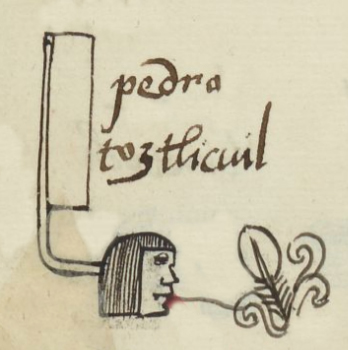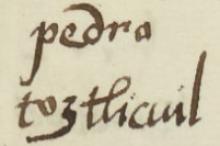Toztli Icuil (MH498v)
This black-line drawing of the compound glyph for the personal name Toztli Icuil (if the two i's have elided in the gloss) is attested here as a man's name. It shows a feather, likely the feather of the yellow parrot (toztli). The feather is upright with a white vane and short lines to indicate downy barbs. Three curls (two to the viewer's right of the feather and one on the left) seem to provide the cuil part of the name.
Stephanie Wood
The spiraling shapes are much like the curls or scrolls on the glyph for a painting or a piece of writing (tlacuilolli). The verb icuiloa means to write or paint. The cuil root could have something to do with curves or squiggles (letters?). If the cuil is a possessed noun, then the glyph could be read as a phrase, the feather's curl or the yellow parrot's curl, if the feather stands for the bird. The spirals seem to suggest movement, and so perhaps the glyph suggests that the feather spins.
Marc Thouvenot identifies the verb icuiloa (or ihcuiloa, with the glottal stop), which means to paint, write, or print, as having a root of -cuil-. He notes how it also appears in tlacuiloliztli (writing), tlacuilo (writer), and cuicuiltic (mottled). He goes on to show various uses of icuiloa that take it beyond the simple definitions just given, resulting in something like the action of creating a design (e.g., on leather, ceramics, sculpture, or in textiles). It can also be something like the action of decorating (e.g., to put a flower on a cup of atole). He associates icuiloa and tlacuilolli with "cultural artifacts," such as arts and crafts or examples of writing and painting, but cuicuiltic with effects created by "nature." This short summary barely does his article justice; it is worth reading the entire piece. How Thouvenot's study might connect with the concept of bent or curved mentioned by Prem (1974: 555, 682) raises an interesting question. Perhaps the bent or curved lines of writing, painting, carving, embroidery, and so on, fall with in the realm of expressions of -cuil-. See
Marc Thouvenot, "Imágenes y escritura entre los nahuas del inicio del XVI," Estudios de Cultural Náhuatl 41 (2010).
Stephanie Wood
pedro
toztlicuil
Pedro Toztlicuil (or perhaps Pedro Toztli Icuil)
Stephanie Wood
1560
Jeff Haskett-Wood
feathers, plumas, volutas, volutes, swirls, curls, nombres de hombres

toz(tli), yellow parrot, https://nahuatl.wired-humanities.org/content/toztli
icuiloa, to write or paint, https://nahuatl.wired-humanities.org/content/icuiloa
El Espiral de la Pluma del Loro Amarillo, o El Espiral del Loro Amarillo
Stephanie Wood
Matrícula de Huexotzinco, folio 498v, World Digital Library, https://www.loc.gov/resource/gdcwdl.wdl_15282/?sp=76&st=image
This manuscript is hosted by the Library of Congress and the World Digital Library; used here with the Creative Commons, “Attribution-NonCommercial-ShareAlike 3.0 License” (CC-BY-NC-SAq 3.0).













